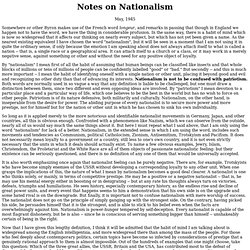

Cephee74. Video: See the First Aerial Footage of an Uncontacted Amazonian Tribe. Uncontacted Tribes.
2011: A Brave New Dystopia - Chris Hedges' Columns. 2011: A Brave New Dystopia Posted on Dec 27, 2010 By Chris Hedges The two greatest visions of a future dystopia were George Orwell’s “1984” and Aldous Huxley’s “Brave New World.”

The debate, between those who watched our descent towards corporate totalitarianism, was who was right. Would we be, as Orwell wrote, dominated by a repressive surveillance and security state that used crude and violent forms of control? We have been gradually disempowered by a corporate state that, as Huxley foresaw, seduced and manipulated us through sensual gratification, cheap mass-produced goods, boundless credit, political theater and amusement. Orwell, as Neil Postman wrote, warned of a world where books were banned. “The Party seeks power entirely for its own sake,” Orwell wrote in “1984.” The political philosopher Sheldon Wolin uses the term “inverted totalitarianism” in his book “Democracy Incorporated” to describe our political system. The result is a monochromatic system of information.
BBC World Service - Documentaries - Argentina - Dancing To The Music Of The Mind. What is this “Western culture” you speak of?
Lifestyle. Mythology. Alternet on Society. United States. George Orwell: "Notes on Nationalism" May, 1945 Somewhere or other Byron makes use of the French word longeur, and remarks in passing that though in England we happen not to have the word, we have the thing in considerable profusion.

In the same way, there is a habit of mind which is now so widespread that it affects our thinking on nearly every subject, but which has not yet been given a name. As the nearest existing equivalent I have chosen the word "nationalism", but it will be seen in a moment that I am not using it in quite the ordinary sense, if only because the emotion I am speaking about does not always attach itself to what is called a nation -- that is, a single race or a geographical area. It can attach itself to a church or a class, or it may work in a merely negative sense, against something or other and without the need for any positive object of loyalty. It is also worth emphasizing once again that nationalist feeling can be purely negative. OBSESSION. INDIFFERENCE TO REALITY. Did societies evolve to be corrupt? Three points: First: It's worth noting that quite a few "law abiding" citizens who are not involved in law enforcement also sometimes ignore the law.

It's not like anyone has perfect virtue, or like all laws are just and reasonable. Second: it makes a lot of sense that corruption is tolerated up to a point. Below a certain threshold, punishing cheaters just isn't worth the effort. It's only when their cheating directly threatens a sufficient proportion of society (like when bankers get bonuses while everybody else loses their job) that the cheaters are quickly shown the door (or the guillotine... depending).
Third: I really wish more science minded people, including evolutionary psychologists, would pay enough attention to anthropological evidence to get it through their brains that strict dominance hierarchies are not any sort of "default" or standard mode of human social organization. Sure, we often function that way, but we quite often don't.
Lost Civilization May Have Existed Beneath the Persian Gulf. Veiled beneath the Persian Gulf, a once-fertile landmass may have supported some of the earliest humans outside Africa some 75,000 to 100,000 years ago, a new review of research suggests.

At its peak, the floodplain now below the Gulf would have been about the size of Great Britain, and then shrank as water began to flood the area. Then, about 8,000 years ago, the land would have been swallowed up by the Indian Ocean, the review scientist said. The study, which is detailed in the December issue of the journal Current Anthropology, has broad implications for aspects of human history. For instance, scientists have debated over when early modern humans exited Africa, with dates as early as 125,000 years ago and as recent as 60,000 years ago (the more recent date is the currently accepted paradigm), according to study researcher Jeffrey Rose, an archaeologist at the University of Birmingham in the U.K. Watery refuge Ironclad case?
History. Dynamic culture. Ethics.